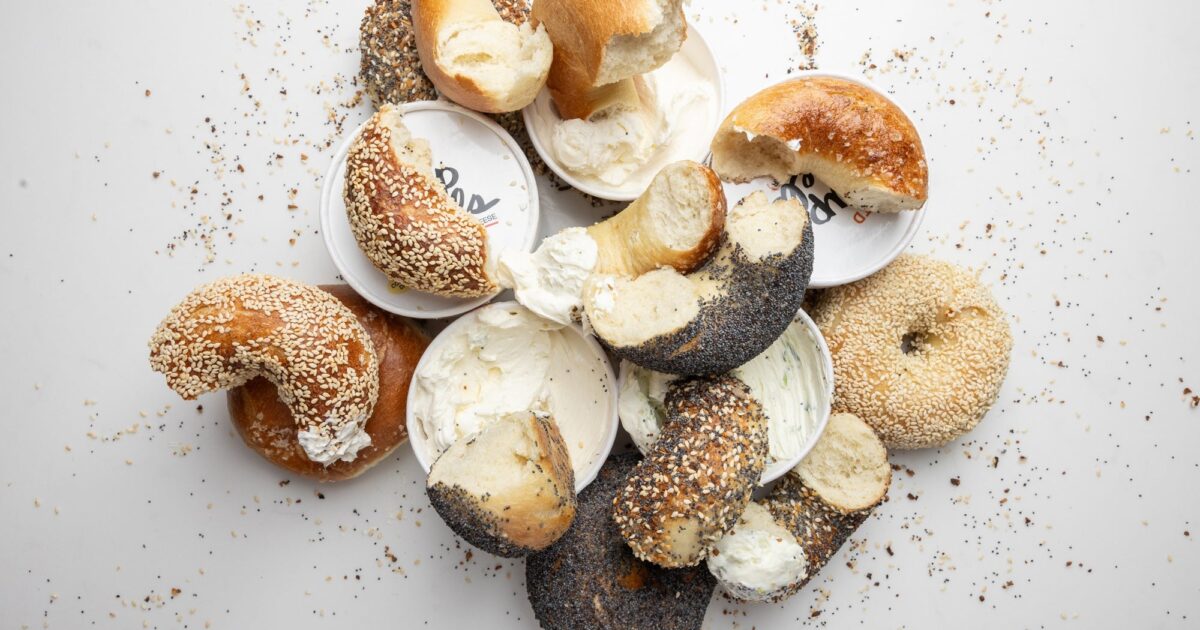The Secret Behind This Viral Bagel Brand’s Franchise Boom

PopUp Bagels, the “Not Famous But Known” brand, has built a cult following with its unique approach to bagels: They’re only served hot and sold in packs of three or more, with rotating weekly “schmears” — unique, flavored cream cheese or butter options — instead of a cluttered menu. That simplicity has translated into explosive growth.
Adam Goldberg founded PopUp Bagels in 2020 in Westport, Connecticut, originally as a backyard bagel pop-up for friends and neighbors during the pandemic. He hadn’t planned to launch a business, but the response was immediate — and overwhelming. What began as a weekend hobby quickly evolved into a full-fledged brand as word spread, lines grew and demand far outpaced his original intentions.
Since launching its franchise program in late 2023, PopUp Bagels has already signed 300 units across 10 states — with fewer than 15 franchisees behind the entire expansion.
“It’s a completely different model,” says Tory Bartlett, who joined the brand as CEO in September 2023. “We’re not selling milkshakes and fries. There are no soda fountains. No ice machines. We’re doing one thing and doing it really well.”
Related: Considering franchise ownership? Get started now to find your personalized list of franchises that match your lifestyle, interests and budget.
Small stores, big numbers
Private equity firm Stripes, PopUp Bagels’ majority investor, recruited Bartlett to lead the company’s franchise strategy. He quickly saw what made the concept so compelling: small-footprint shops (typically 1,000 to 1,200 square feet), minimal equipment, low labor requirements — not to mention massive demand. Some high-volume units are generating $5 million annually with just 12 employees on the books.
“Our shops don’t even have seats,” Bartlett says. “They’re grab-and-go. And we’re open from 7 a.m. to 4 p.m. That makes it incredibly attractive for talent — our chefs can be home in time to pick up their kids from school.”
The brand’s core philosophy, Bartlett says, is all about stewardship over sprawl. While some franchise systems chase volume by selling off large numbers of single-unit deals, PopUp took the opposite approach, giving large territories to a small, carefully selected group of operators.
“I’ve turned down well-capitalized people because they weren’t the right fit,” Bartlett says. “We’re looking for experienced franchisees who know their local market, have infrastructure in place and want to be hands-on. If you’re just looking for mailbox money, this isn’t the concept for you.”
Related: Emma Grede Dropped Out of School at 16. Now the Skims Boss Runs a $4 Billion Empire — Here’s How.
Unique vibe
That intentionality has helped the brand retain its cult-like vibe even as it expands. Shops are designed for speed, energy and Instagram-worthy experiences, with “bagel bouncers” controlling the line and music pumping in the background. Every bagel is sold hot and fresh, and the secret sauce — literally — is in the schmear.
“We’ve had 500 people lined up at 5 a.m. for pop-up openings,” Bartlett says. “That’s not normal bagel behavior.”
Franchisees see the energy firsthand. “We did a pop-up event with Rob Gronkowski’s restaurant in Tampa, and within three minutes of posting about it, the bagels were sold out,” says Kal Gullapalli, CEO of MPZ Holdings, which is about to open its first PopUp location in Tampa and owns the PopUp franchising rights for most of Florida. “It just shows you how strong the brand is, even in markets where we haven’t opened yet.”
Gullapalli, who plans to eventually open 30 PopUp locations in Florida, is already a multi-unit operator in the Marco’s Pizza and Dave’s Hot Chicken systems — something that made him a perfect candidate for PopUp ownership. “We’re wildly bullish on the prospects of this category,” he says. “Along with Dave’s, this is going to be our fastest-growing portfolio, with a lot of capital being allocated to it.”
Related: A Billionaire Who Operates More Than 2,400 Franchises Knows These Types of Franchisees Make the Most Money
Playing to its (growing) audience
In an era where skyrocketing buildout costs and flat sales are squeezing traditional restaurant ROI, Bartlett sees PopUp as part of a new wave of smarter, more focused food concepts — alongside brands like Everbowl.
“Since Covid, the cost of building a restaurant has gone up 40% — and stayed there,” he says. “Meanwhile, sales haven’t followed. We designed this brand to deliver 20-plus percent margins. That’s what makes it sustainable.”
PopUp Bagels is already operating in New York, Boston and Connecticut, with new stores opening soon in Florida, San Diego’s La Jolla neighborhood, L.A.’s Brentwood neighborhood and other major markets. And while the growth is impressive, Bartlett is careful not to let speed compromise quality.
“We’re not trying to be the next bagel chain,” he says. “We’re trying to be the best version of ourselves, one hot bagel at a time.”
Join top CEOs, founders and operators at the Level Up conference to unlock strategies for scaling your business, boosting revenue and building sustainable success.
PopUp Bagels, the “Not Famous But Known” brand, has built a cult following with its unique approach to bagels: They’re only served hot and sold in packs of three or more, with rotating weekly “schmears” — unique, flavored cream cheese or butter options — instead of a cluttered menu. That simplicity has translated into explosive growth.
Adam Goldberg founded PopUp Bagels in 2020 in Westport, Connecticut, originally as a backyard bagel pop-up for friends and neighbors during the pandemic. He hadn’t planned to launch a business, but the response was immediate — and overwhelming. What began as a weekend hobby quickly evolved into a full-fledged brand as word spread, lines grew and demand far outpaced his original intentions.
Since launching its franchise program in late 2023, PopUp Bagels has already signed 300 units across 10 states — with fewer than 15 franchisees behind the entire expansion.
The rest of this article is locked.
Join Entrepreneur+ today for access.

